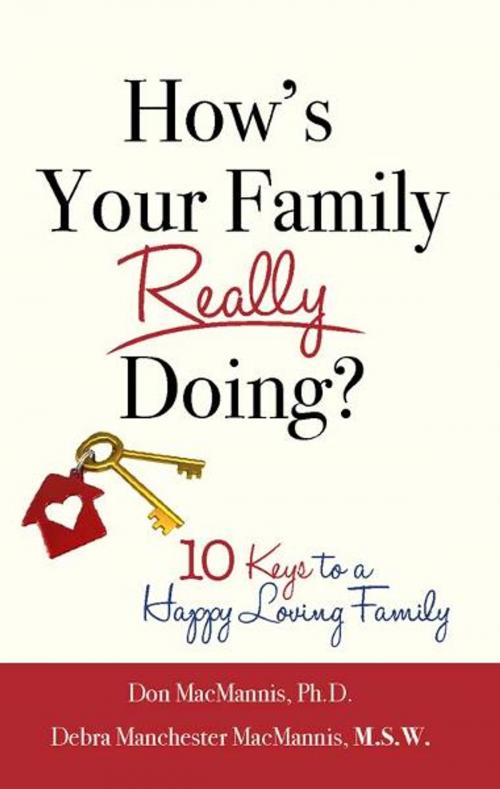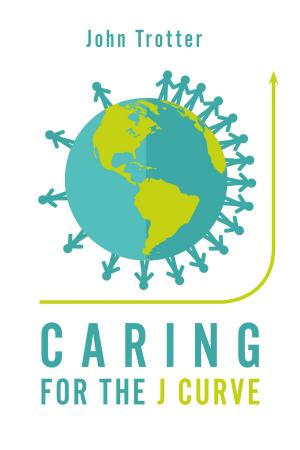How's Your Family Really Doing? 10 Keys to a Happy, Loving Family
Nonfiction, Family & Relationships, Parenting| Author: | Don MacMannis, PhD and Debra Manchester MacMannis, MSW, Debra Manchester MacMannis, M.S.W. | ISBN: | 9781618420978 |
| Publisher: | BookBaby | Publication: | August 22, 2011 |
| Imprint: | Language: | English |
| Author: | Don MacMannis, PhD and Debra Manchester MacMannis, MSW, Debra Manchester MacMannis, M.S.W. |
| ISBN: | 9781618420978 |
| Publisher: | BookBaby |
| Publication: | August 22, 2011 |
| Imprint: | |
| Language: | English |
For most people, family is valued above all else. But the kind of family we want and the family we’ve created can be as different as night and day. Families can be our greatest comfort or the source of our deepest pain. Unprecedented levels of stress, massive cultural shifts, and new technologies challenge the way we live. We are flooded with more information and one-size-fits-all solutions than anyone can sort through, and it is little wonder parents feel at a loss for answers when their families are in crisis. Because most of us haven’t had classes in how to be a family, Don MacMannis, Ph.D., and Debra Manchester MacMannis, M.S.W., have written How’s Your Family Really Doing? 10 Keys to a Happy Loving Family (Two Harbors Press, $15.95), a guidebook that synthesizes contributions from family studies, psychological and brain research, systems theory and spirituality. The book highlights the ten essential keys that define successful families and provides practical tools to personalize every reader’s experience. As a society, we are relentlessly inundated with “how to books” that typically focus on symptoms that one or more family members are experiencing- anxiety, depression, school problems, out of control behaviors, addictions, etc. But parents buying books about fixing specific problems are often frustrated when trying new techniques without success. That’s because these books fail to include what else may be going on in the family that can create or maintain problem behaviors. In contrast, How’s Your Family Really Doing? provides the reader with a checklist of the most important, underlying “family factors” that can add to their efforts at change. The book begins with a 50-point questionnaire—the Current Family Assessment—to evaluate the family, identify where it is thriving, and explore where improvements are needed. Upon completing the questionnaire, readers learn which of the 10 Keys to a Happy Loving Family need attention and why. Providing practical tools for families in any stage of the life cycle, it is concise, engaging, and designed to capture the interest of working moms and dads who are often too busy to pore through lengthier works. “As practicing psychotherapists for 30-plus years, we have worked with thousands of couples and families who have reached out for help,” explain the authors. “Our model is positive, practical, and strength-based, and this book is an extension of that affirming approach.” How’s Your Family Really Doing? helps parents: • Recognize the characteristics of healthy families and how to bring out the best in one another. • Identify their family’s strengths and areas needing improvement. • Facilitate conversations about desired changes. • Create a working set of goals to focus efforts at improvement. • Examine the similarities and differences between their family of origin and current family. • Find specific ways to strengthen skills for each of the 10 Keys. How’s Your Family Really Doing? provides parents with the knowledge and resources to create happier, healthier, and more loving families for a lifetime.
For most people, family is valued above all else. But the kind of family we want and the family we’ve created can be as different as night and day. Families can be our greatest comfort or the source of our deepest pain. Unprecedented levels of stress, massive cultural shifts, and new technologies challenge the way we live. We are flooded with more information and one-size-fits-all solutions than anyone can sort through, and it is little wonder parents feel at a loss for answers when their families are in crisis. Because most of us haven’t had classes in how to be a family, Don MacMannis, Ph.D., and Debra Manchester MacMannis, M.S.W., have written How’s Your Family Really Doing? 10 Keys to a Happy Loving Family (Two Harbors Press, $15.95), a guidebook that synthesizes contributions from family studies, psychological and brain research, systems theory and spirituality. The book highlights the ten essential keys that define successful families and provides practical tools to personalize every reader’s experience. As a society, we are relentlessly inundated with “how to books” that typically focus on symptoms that one or more family members are experiencing- anxiety, depression, school problems, out of control behaviors, addictions, etc. But parents buying books about fixing specific problems are often frustrated when trying new techniques without success. That’s because these books fail to include what else may be going on in the family that can create or maintain problem behaviors. In contrast, How’s Your Family Really Doing? provides the reader with a checklist of the most important, underlying “family factors” that can add to their efforts at change. The book begins with a 50-point questionnaire—the Current Family Assessment—to evaluate the family, identify where it is thriving, and explore where improvements are needed. Upon completing the questionnaire, readers learn which of the 10 Keys to a Happy Loving Family need attention and why. Providing practical tools for families in any stage of the life cycle, it is concise, engaging, and designed to capture the interest of working moms and dads who are often too busy to pore through lengthier works. “As practicing psychotherapists for 30-plus years, we have worked with thousands of couples and families who have reached out for help,” explain the authors. “Our model is positive, practical, and strength-based, and this book is an extension of that affirming approach.” How’s Your Family Really Doing? helps parents: • Recognize the characteristics of healthy families and how to bring out the best in one another. • Identify their family’s strengths and areas needing improvement. • Facilitate conversations about desired changes. • Create a working set of goals to focus efforts at improvement. • Examine the similarities and differences between their family of origin and current family. • Find specific ways to strengthen skills for each of the 10 Keys. How’s Your Family Really Doing? provides parents with the knowledge and resources to create happier, healthier, and more loving families for a lifetime.















